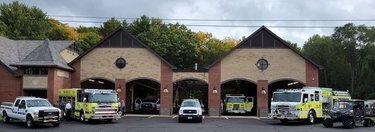Two sides on growth in Guilderland
GUILDERLAND — Two views on growth in Guilderland were espoused by residents at the May 3 town board meeting. One resident said more affordable housing is needed while another worried Guilderland doesn’t have the infrastructure to handle more growth.
Robyn Gray, who lives on Amanda Lane in the Fort Hunter area of town, said she had a friend over, making tea, who was appalled at the smell of the municipal water.
“It stinks,” said Gray, who frequently comments at town board meetings.
She asked why “all these subdivisions” keep getting approved and she questioned if the town would continue to have enough water with the new residences online
Councilwoman Rosemary Centi responded that the town has won awards for its water quality and said that Timothy McIntyre, Guilderland’s water superintendent, is directly involved in the planning for each building project. “He says we’re good,” reported Centi.
Supervisor Peter Barber said Gray’s part of town is served by an aquifer from Rotterdam. Gray said she and her neighbors will have their water tested by McIntyre.
At the same meeting, Eric Wells, a member of the Fort Hunter Fire Company, established by volunteers in 1950, told the board, “Right now, there’s not a lot of apartments or housing for us younger guys when we move out of our parents’ houses.”
To be a member of the fire company, Wells said, volunteers have to live within a mile of the edge of the district as the crow flies. Six of seven members who are living in apartments outside of their parents’ houses are outside of the district, Wells said.
“We lost two members who had to move out because their rent went up $200,” said Wells, who hasn’t before addressed the town board.
Most fire departments in town — they are all staffed by volunteers — have trouble recruiting and retaining members, Wells said. “There are two departments in town … pretty much on life support,” he said.
He urged the board members, “Reach out to your local fire departments to see what you can do to better help us help you.”
Wells said it took him three months to find an apartment. He’s now living in Carpenter Village. The fire company’s policy used to be that only 20 percent of its members could live outside the district but, in order not to lose Wells, “They had to bump it up to 40 percent,” he said.
Wells also said that the average age of Fort Hunter Fire Company members is 45 to 50 while the peak age for interior firefighters is 18 to 40.
Guilderland’s town planner, Kenneth Kovalchik, mentioned both issues at a forum last month. He said the town needs more affordable housing and also said that water consumption has reached the point where Guilderland is looking for grants to try to bring two of the town’s three wells, which have unacceptable levels of iron and manganese, back online with a filtration system.
Water needs to be addressed in the town’s comprehensive plan update, Kovalchik said, a process the town has begun in earnest.
Black Creek Run
The town board declared lead agency status under the State Environmental Quality Review Act, for the Black Creek Run planned unit development.
Barber said it is a Type 1 action because the project exceeds 25 acres.
The development for 6250 Depot Road from applicant Rosetti Acquisitions includes 24 single-family homes, 14 senior apartments, and eight townhome units.
Rosetti is proposing country-hamlet zoning for the 34.8-acre parcel located across the street from Guilderland High School. Under its current zoning designation, Rural Agricultural 3 (RA3), only a fraction of the 46 units would be permitted that are allowed with hamlet zoning, which would allow for the clustering of buildings.
The application had been reviewed by Guilderland’s town board and zoning board between 2004 and 2015, according to a memo from Kovalchik to Barber, and in 2015 the town board approved a zoning change but no local law was adopted.
“You want to get the input of all involved and interested agencies,” Barber said at the May 3 meeting. Letters will be sent to the Guilderland Planning Board, Albany county’s planning board and department of public works, the state’s Historic Preservation Office and Department of Environmental Conservation, and the Army Corps of Engineers.
The agencies will have 30 days to comment and express interest if one wants to become the lead agency. Barber surmised, “Nobody else wants to be lead agency.”
He noted the “extensive file” the town has amassed on the project over nearly two decades and said, “We’re taking this from square one.”
Barber also said, “I still think we have to respect the fact a prior town board — I think in November 2015 — did grant the rezone.”
The town board will hold at least two public hearings, Barber said, and the planning board will probably hold one.
Other business
In other business at its May 3 meeting, the Guilderland Town Board:
— Awarded a contract for $2,646,055 to American Evergreen Inc., the lowest responsible bidder, for the final phase of the McKownville stormwater improvement project. The highest of four bids came in at $3.9 million; American Evergreen’s was the lowest.
The funding will come from previous awards, said Barber, along with sewer funds; the project will keep stormwater from going to the town’s water plant, which has capacity issues, he said.
John K. Brust, a principal at Delaware Engineering, wrote in a memo to Barber, “There was approximately $1.5 million remaining in the Phase 1 project budget when the town terminated the contract with Bast Hatfield due to conflicts with National Grid underground utilities. Subsequent negotiations with the utility resulted in a sizeable claim settlement.”
Brust recommended making up the $833,000 shortfall with town’s wastewater system reserve funds;
— Scheduled a public hearing for June 21 at 7 p.m. at the Guilderland Town Hall on a proposed local law to prohibit programmable digital signs;
— Approved a $627,272 project to pave 8.33 miles of town roads this year.
Guilderland has 168 centerline miles of roads, according to a memo from Highway Superintendent Gregory Wier to Barber, who said, “It is recommended that each mile have some form of surface treatment every ten years.”
However, Wier plans to cover just 8.33 miles this year. Money from the state will total $461,713 while town highway taxes will cover $165,559.
“Every day that goes by, that seems to go up,” said Barber.
The roads slated for paving this year include those in McKownville affected by the stormwater project — Ann, Mercer, Warren, Providence, and Tracy Streets along with Knowles Terrace and Waverly Place — as well as Cuyler Court, Kennewyck Circle, Normanskill Place, Pinkster Lane, Quidor Court, and Wycham Court in Kennewyck and Hurst Road and parts of Ostrander and Wormer Roads; and
— Approved the purchase of a used rollback truck from Guilderland Towing for $58,000.
Wier wrote in a memo to Barber that the truck will be used for “transporting everything from cars to large ambulances” and will save the town towing and transport fees. He said that funds from federal coronavirus aid can be used.
Barber told the board the truck purchase would save the town at least $10,000 a year in fees.



